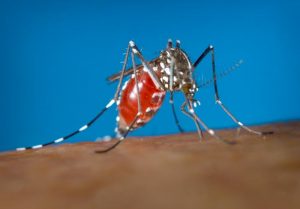By NewsDesk @infectiousdiseasenews
The dengue epidemic continues on Reunion Island: indicators are still increasing, illustrating a larger epidemic this year than at the same date last year. In 2019 and 2020, there were 18,206 and 16,050 cases, respectively.
Through May 4, 9,740 confirmed dengue cases have been reported since the beginning of the year, including 289 hospitalizations and two deaths directly linked to the virus.
 Confirmed cases and isolated cases have been reported in 21 communes, mostly in the West.
Confirmed cases and isolated cases have been reported in 21 communes, mostly in the West.
Pilot tests for the release of sterile male mosquitoes, on the ground and then by drone, have started in Saint-Joseph, with the aim of reducing, or even eliminating locally, the populations of one of the mosquito vector species of dengue.
This is the first time that reinforced Sterile Insect Technique (SIT) and the use of drones for the releases of sterile male mosquitoes have been tested in the field in urban areas.
A first phase of mark-release-recapture started in April: during this phase of six releases, 10,000 sterile male mosquitoes are released per week, in order to estimate their survival, their dispersal and their sexual competitiveness with wild mosquitoes. Two release techniques are tested: on the ground and then by drone.
The best release technique will be selected during the second phase of the fight, which will take place after a restitution to elected officials and residents of the municipality of Saint-Joseph, as well as to the Regional Health Agency (ARS) and the Departmental Council. environment and health and technological risks (Coderst).
This phase will correspond to the release of 50,000 sterile males per week.
Teams from the town hall of Saint-Joseph and CIRAD informed, door to door, for two weeks before the operation, the nearly 200 households living in the vicinity of the operation.
A review of pilot tests by August

Image/CDC
These trials are complementary to those of the IRD which aim to control the main vector of dengue, Aedes albopictus, in the commune of Sainte-Marie.
The Revolinc project aims to demonstrate that the enhanced SIT makes it possible to locally eliminate a relatively isolated vector as is the case of Aedes aegypti in Reunion Island. The objective is to avoid the recolonization of the ecological niches of Aedes albopictus by Aedes aegypti. ” If these tests are conclusive on localized populations of Aedes aegypti, this solution could then be deployed on a larger scale” , specifies Jérémy Bouyer.
The results of these pilot tests will be drawn up and returned in August to all the players concerned. If it is positive, the reinforced TIS approach and the use of drones could be deployed in the longer term against Aedes albopictus in Reunion Island.
- White-nose syndrome reported in bats in New Mexico
- Ivermectin is highly effective as a safe prophylaxis and treatment for COVID-19: Comprehensive review
- Trichinosis outbreak sickens more than 100 in Argentina, Linked to chacinados (salami)
- Sweden: 25% of blood donors in Stockholm test positive for SARS-CoV-2 antibodies
- AstraZeneca vaccine: Norway and Denmark researchers show an increased rate of rare but serious blood clots in the brain and venous blood clots
- South Africa reports 4 cases of India variant B.1.617.2
- TB alert at the University of Auckland
- The Caribbean: CARPHA urges the public to protect against mosquito borne diseases like dengue


